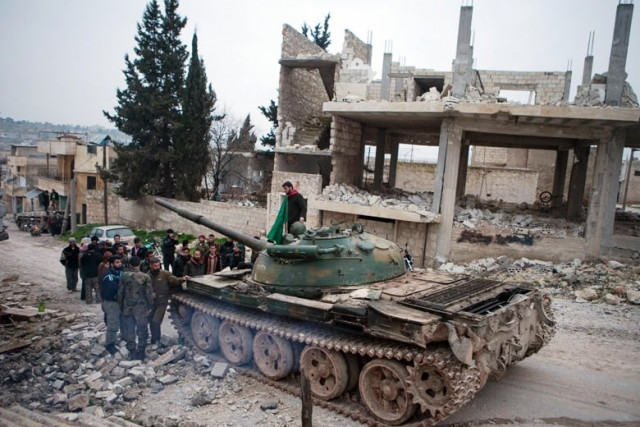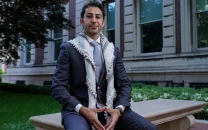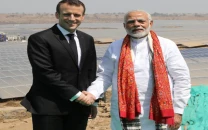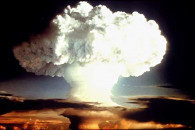Iran commander killed, jets downed in blow for Syria regime
Insurgents had also overran a military air base in Aleppo province.

A file photo of Syrian rebels gathered around a T-72 tank, captured from government forces on February 10, 2013. PHOTO: AFP
The ambush that killed the Revolutionary Guards commander, the downing of the aircraft in the northwest and the seizure of the town of Shadadeh near the Iraqi border amounted to four straight days of battlefield successes for the rebellion.
The insurgents overran a military air base in Aleppo province on Tuesday, after taking control of Syria's largest dam in the neighbouring province of Raqa the day before.
The latest setbacks came after US Secretary of State John Kerry said Assad needed to abandon hopes of riding out the war and accept the "inevitability" of his departure.
On Thursday, Iran's Revolutionary Guards said one of its commanders, Hassan Shateri, was "martyred... at the hands of Zionist regime mercenaries and backers" while travelling by road between Damascus and Beirut.
The Guards said he had headed the Iranian Committee for the Reconstruction of Lebanon, and the Iranian embassy in Beirut gave a similar account.
Iranian Foreign Minister Ali Akbar Salehi strongly condemned the killing as a "terrorist act" and paid tribute to "this commander of Islam and his tireless efforts in reconstruction."
A strong ally of the Damascus regime, Tehran often refers to rebels fighting Assad's troops as "terrorists" with ties to arch-foe Israel.
Syria's rebellion flared after Assad's forces launched a bloody crackdown on peaceful democracy protests that erupted in March 2011, inspired by the Arab Spring uprisings, but it has become increasingly dominated by Islamist groups.
In London, British Foreign Secretary William Hague warned that Islamist militants from Western countries who had gone to fight in Syria could launch terrorist attacks on their return.
Hague said Syria had become the "number one destination" for jihadists worldwide.
One of the most prominent radical Islamist groups, the al Nusra Front, took the town of Shadadeh in the oil-rich northeastern province of Hasakeh on Thursday.
"After three days of fierce battles against the army, al Nusra Front fighters have seized control of Shadadeh," said the Syrian Observatory for Human Rights.
Fighting and car bombings by the jihadists have killed more than 100 troops in three days, during which 30 al Nusra Front fighters also died, five of whom were from Kuwait, said the Observatory.
Elsewhere, the army made its own advances, taking a district in the central city of Homs after weeks of heavy clashes.
The victory comes a week after the army took control of Kafraya on the southwestern outskirts of Homs, a city opposition activists refer as "the capital of the revolution."
The Observatory said an armed group in northwest Syria on Thursday hijacked a bus and kidnapped at least 40 civilians, mostly women and children, from Shia villages.
The watchdog also gave a death toll in violence nationwide on Thursday of 126, among them 23 civilians.
In Washington, Kerry said the toll from the conflict may have reached 90,000, citing figures provided by his Saudi counterpart Prince Saud al-Faisal - sharply up on UN estimates of nearly 70,000 people killed.
State Department spokeswoman Victoria Nuland scotched rumours that Kerry was planning to visit Damascus on his first foreign trip as secretary of state "until we are in a place where the Syrian people have gotten on the road to meeting their aspirations for a free and democratic country.
"He also has zero intention to talk to Assad."
Kerry had earlier suggested taking renewed steps to urge Syrian ally Russia to bring more pressure on Assad to quit, after Moscow insisted it was ready to host talks with both sides.
Syria welcomed Russia's invitation, while stressing its foreign minister would not meet Ahmed Moaz al Khatib, the opposition chief who has offered to hold peace talks with regime officials without blood on their hands.
Saudi pan-Arab daily Asharq al Awsat, meanwhile, reported that a new peace plan drafted "under UN supervision" involving the creation of a 140-member senate to oversee a power transition was doing the rounds at the United Nations.
However, the UN chief's deputy spokesman Eduardo del Buey dismissed the report, saying: "That report as far as I am concerned does not have any validity."



















COMMENTS
Comments are moderated and generally will be posted if they are on-topic and not abusive.
For more information, please see our Comments FAQ